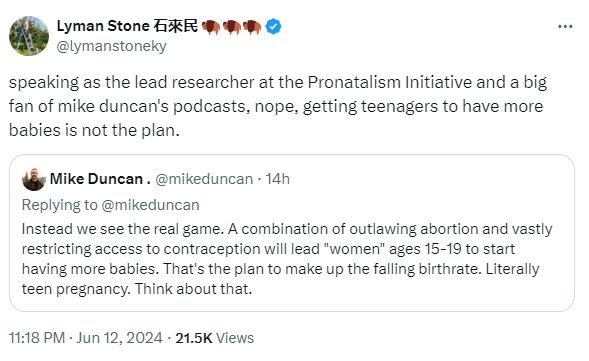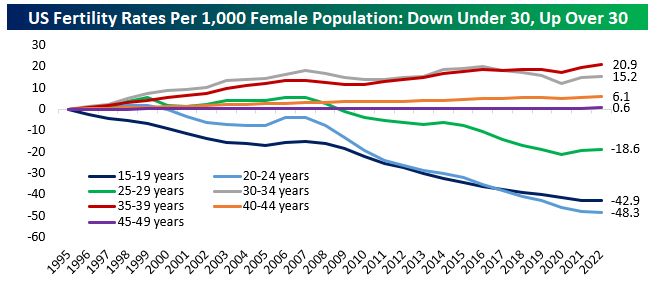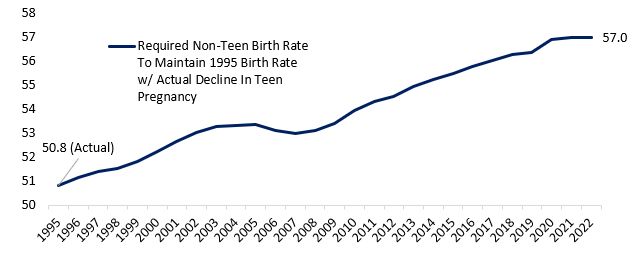Globally the FTR is still above 2.4. If you look at the distribution there seems to be a huge correlation with life opportunities as perceived by the relevant age group. Perhaps we should turn that knob, right?
Replies
To be specific, we should stimulate #opportunities of those with the bad luck to be born in a poor country. We could start with #education and sharing #intellectualProperty
The “lower teen pregnancy shows [white] civilization is collapsing” just shows these people are incapable of ever being happy about anything.
LMAO because they squawked about that for years. THEN they claimed single parents would cause crime. Then the crime rate dropped. So now they pretend we’re ‘facing human extinction’ (though planet will have 2 billion more humans in the next 50 years) and crime is up (it is down to 1950s levels).
one part of it is that they just do not understand basic facts and arithmetic.
On the contrary, I'm increasingly convinced that the key to happiness is not understanding facts or arithmetic
I mean surely as a mathematical matter if 20-29 went up enough it would go over 2? but I do agree that is what Stone is aiming for
Would likely need to happen mostly in the 20-24 cohort, which would also be bad. The changes overall (both the drops and the increases) represent people having more control over their reproduction.
surely the skyrocketing cost of children is part of the story too?
I really think that’s an overemphasized aspect, which is why you don’t typically see much impact on TFR from subsidized childcare etc. I really doubt there are a bunch of 22 year olds who want kids but can’t swing daycare. It’s a broader issue of autonomy and opportunity.
Just anecdotally if you are having kids 20-24 you are probably relying on your family network to provide child care.
Mathematically, yes, you could make it happen. That's the point of the last chart! But nobody arguing for higher fertility rates now says "what I mean is a fertility rate for non-teens substantially above 30 years ago" or "teen pregnancies way up". You *must* pick one of those two.
yep. you want to help the--imo quite substantial--population of people who want to have kids earlier but can't afford it, you need MASSIVE welfare expansions. or we can do the Full Ceaușescu
You might be able to do it with the Never Happen Here triple: Much lower housing costs, at least 10x smaller student debt, medicare-for-all*. *or similar plan, as implemented by literally every other reasonably-wealthy country on earth.
We should do a lot of stuff the pro-natalists want in terms of expanding the social safety net for parents and children, no doubt. But very very unlikely that will raise the birth rate much. see a really good recent Max Fischer pod on this (transcript included)
yeah I've seen that research, but I agree with Steve Waldman that if you actually wanted to move the needle with benefits they would likely have to be many times larger that even what the Nordics give out drafts.interfluidity.com/2024/02/06/d...
And that’s not going to happen here, we’re nowhere close to Nordic welfare levels and never have been
tbc we should increase those benefits regardless of the implications for natality. but the point the pod makes is that it doesn't appear increasing benefits has helped *anywhere*.
I think that's overstated, see this paper. I'd guess that if we did a year of paid leave, big child allowance, free daycare, and universal Medicare it would have a pretty large effect given the atrocious status quo www.unfpa.org/sites/defaul...
I am sure it would have a positive effect. But the point of the numbers above is to show that if you rule out teen pregnancies, you need enormous effects to get to a replacement rate, and there's zero evidence any policy can do that.
A marginal but real effect could come from vehicle design. Families are purposely capping at 2 kids so they don't need to get a bigger boat or otherwise solve the car seating problem. As much as teen pregnancy is down, so too are bigger families.
My argument isn't that we shouldn't support families. My argument is that targeting a TFR of 2.1 or so is a complete waste of time and not a useful end in and of itself.
My hot take is that the most effective lever for increasing fertility would be a massive social program to get men to be better domestic partners. A lot easier to have 3 kids if both parents pull their weight.
I think it’s very possible for fertility rates to pop up again (a bit!) but it seems to have more to do with big social movement trends rather than yeah, subsidies
sure
Do the pronatalists actually want that? I sure haven't seen Musk or that fascist dorky couple advocating for it
some claim to, some don't
United States of America is doing part of “the full Ceausescu” by outlawing abortions and any other contraception. The full Ceausescu involves benefits for families including money (and increased sums for those w 5+ children and 10+ children!). (Not a fan but that’s how it was)
More and more, I think a big part of that could be accomplished with heavily subsidized or free housing for people who have more kids in their 20s. Medicare/Medicaid for all kids and parents for life and student loan forgiveness could, IMO, move the needle in the US.
I know people point to the data and say that more generous social safety net and parental support programs haven't helped much in Europe and Asia. The difference, ISTM, is that most other wealthy countries were starting from a much more generous welfare state *before* implementing natalist policies.
I don't think it's good that the US has such a meager social safety net compared to peer nations, but one silver lining may be that implementing even basic programs like guaranteed housing, healthcare, and education for parents and children is far more effective here than other places.
For example, long before many wealthy countries in Europe and Asia implemented pronatalist policies they already provided citizens low-cost or free education, healthcare, and housing. ISTM new social welfare programs are less effective at changing behavior the more basic needs are already met.
Also, ISTM a lot of the cash incentives many other countries offer to parents are wholly inadequate in large part because there are many costs involved in raising children that don't show up in official statistics but that many parents see as obligatory (tutors, cram schools, sports, etc.).
I think this is particularly true for aspirational middle-class parents. For many parents in this group, the mandatory costs of childcare go well beyond food, shelter, and clothes.
A lot of people think low cost, subsidized childcare would also help, but I'm increasingly skeptical that this would be either workable or effective in the US. There just isn't a good way to safely and ethically scale professional childcare.
Wouldn't more young immigrants also work? I think the policies not proposed to address fertility is the most interesting part. Like you could also imagine a "pro-natalist" movement encouraging child rearing during college, not even a terrible idea, but it's just not happening afaict.
more immigration helps alter the population trajectory but not the birth rate (generally)
Does birth rate correct for demographics?
I don't know what you mean by that
I don't really know either. Just seems like having a younger population with an immigration policy oriented towards that would affect the fertility rate in a pretty obvious way.
When these charts say "births per 1,000", is that actually "births per 1,000 per year"? Just wondering about the conventions and labels, here. Demographic statistics isn't anywhere near any area of expertise of mine, but it seems like there must be an unspoken time interval
Yes, it's (number of births in year) / (population in year).
“Lead researcher”. Legit lol.
Is Lyman the "least favorite psychopath"? Just curious, because I had him in a couple of classes when he was in college and really liked him. I didn't know him, but enjoyed having him in class. Wonder the trajectory that sent him to Pronatal Research Institute or whatever.
Is Lyman back at it
this is from last year, just resurfacing because people are talking about fertility




